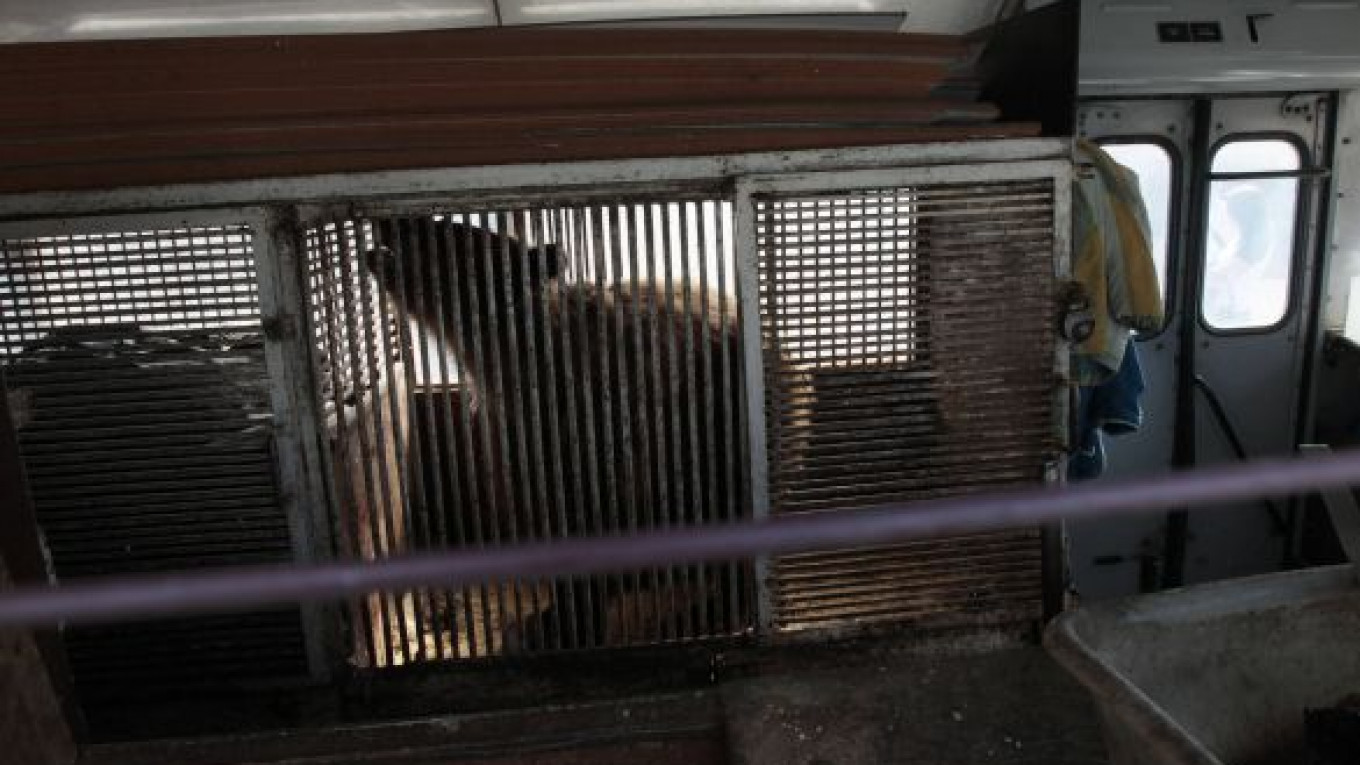ST. PETERSBURG — For two years, a 36-year-old bear who performed during the 1980 Moscow Olympics has been kept with other retired circus animals in a rusty old bus parked on the outskirts of St. Petersburg.
Animal rights activists say they receive only minimal care in their cramped and stinking cages.
Katya the bear was a longtime star of the Big St. Petersburg State Circus on Fontanka, where night after night she and another bear delighted children by riding motorcycles around the ring.
During the 1980 Summer Games, the bears were applauded by thousands at a ceremony opening the football competition in St. Petersburg, then called Leningrad. Katya also performed in two movies released in the 1980s.
Since her retirement in 2009, Katya and the painted bus on which she once toured with the circus have not left a parking lot near a busy highway. The aging bear spends the long hours jumping up and down in her cage and trying to crack the rusty metal railings with her chipped and yellowed teeth.
Dozens of other retired circus animals also live in the smelly cages placed inside the bus and a minivan parked nearby.
Some occasionally are taken out to accompany photographers to downtown St. Petersburg to have their pictures taken with children and tourists. Others never get washed or examined by veterinarians, animal rights activists say.
"They can't move normally and start going crazy," Zoya Afanasyeva of the Vita animal rights group said as she stood by Katya's sweltering bus on a hot summer day.
"Apparently they are being taken care of, but not more often than once a day, and this care is perfunctory because the smell here in the parking lot is unbearable," Afanasyeva said.
Klava the bear shares a small cage with Pasha the boar. Birds with atrophied muscles live next to cats that do not meow and stare straight ahead with pus-covered eyes.
Circus director Viktor Savrasov said the animals are cared for and Katya's fate would have been worse if her trainer had agreed to have the bear put to sleep.
"Whatever happened, she did not leave her," he said of retired trainer Natalya Arkhipova, who still visits Katya to feed her.
Ukraine's Environment Minister Mykola Zlochevsky vowed on Wednesday to free all bears kept in restaurants for entertainment purposes and often forced to drink alcohol, Interfax reported.
Captured and tamed bears were often used for entertainment in the Russian Empire, which included Ukraine, turning the animal into a national symbol.
The practice appears to have also survived Ukraine's emergence from Soviet rule, but Zlochevsky on Wednesday said it was inhumane and unacceptable.
"On television, they keep showing bears suffering in restaurants and roadside hotels," Interfax quoted him as saying. "How long can we tolerate animal torture in restaurants where drunken guests make bears drink vodka for laughs?"
Zlochevsky said his ministry was building a large enclosure in a wildlife sanctuary where it would place about 80 bears it planned to liberate.
A Message from The Moscow Times:
Dear readers,
We are facing unprecedented challenges. Russia's Prosecutor General's Office has designated The Moscow Times as an "undesirable" organization, criminalizing our work and putting our staff at risk of prosecution. This follows our earlier unjust labeling as a "foreign agent."
These actions are direct attempts to silence independent journalism in Russia. The authorities claim our work "discredits the decisions of the Russian leadership." We see things differently: we strive to provide accurate, unbiased reporting on Russia.
We, the journalists of The Moscow Times, refuse to be silenced. But to continue our work, we need your help.
Your support, no matter how small, makes a world of difference. If you can, please support us monthly starting from just $2. It's quick to set up, and every contribution makes a significant impact.
By supporting The Moscow Times, you're defending open, independent journalism in the face of repression. Thank you for standing with us.
Remind me later.






